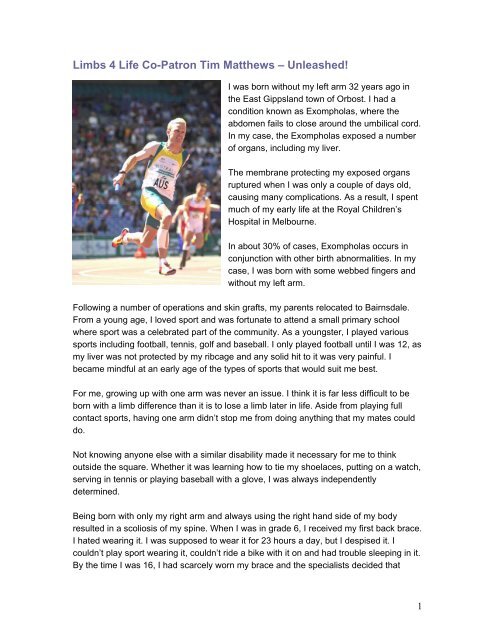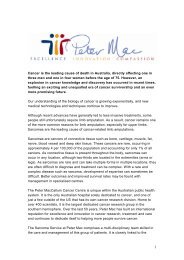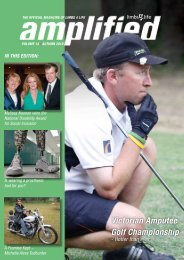I was born without my arm almost about 30 (32) years ... - Limbs 4 Life
I was born without my arm almost about 30 (32) years ... - Limbs 4 Life
I was born without my arm almost about 30 (32) years ... - Limbs 4 Life
Create successful ePaper yourself
Turn your PDF publications into a flip-book with our unique Google optimized e-Paper software.
<strong>Limbs</strong> 4 <strong>Life</strong> Co-Patron Tim Matthews – Unleashed!<br />
I <strong>was</strong> <strong>born</strong> <strong>without</strong> <strong>my</strong> left <strong>arm</strong> <strong>32</strong> <strong>years</strong> ago in<br />
the East Gippsland town of Orbost. I had a<br />
condition known as Exompholas, where the<br />
abdomen fails to close around the umbilical cord.<br />
In <strong>my</strong> case, the Exompholas exposed a number<br />
of organs, including <strong>my</strong> liver.<br />
The membrane protecting <strong>my</strong> exposed organs<br />
ruptured when I <strong>was</strong> only a couple of days old,<br />
causing many complications. As a result, I spent<br />
much of <strong>my</strong> early life at the Royal Children’s<br />
Hospital in Melbourne.<br />
In <strong>about</strong> <strong>30</strong>% of cases, Exompholas occurs in<br />
conjunction with other birth abnormalities. In <strong>my</strong><br />
case, I <strong>was</strong> <strong>born</strong> with some webbed fingers and<br />
<strong>without</strong> <strong>my</strong> left <strong>arm</strong>.<br />
Following a number of operations and skin grafts, <strong>my</strong> parents relocated to Bairnsdale.<br />
From a young age, I loved sport and <strong>was</strong> fortunate to attend a small primary school<br />
where sport <strong>was</strong> a celebrated part of the community. As a youngster, I played various<br />
sports including football, tennis, golf and baseball. I only played football until I <strong>was</strong> 12, as<br />
<strong>my</strong> liver <strong>was</strong> not protected by <strong>my</strong> ribcage and any solid hit to it <strong>was</strong> very painful. I<br />
became mindful at an early age of the types of sports that would suit me best.<br />
For me, growing up with one <strong>arm</strong> <strong>was</strong> never an issue. I think it is far less difficult to be<br />
<strong>born</strong> with a limb difference than it is to lose a limb later in life. Aside from playing full<br />
contact sports, having one <strong>arm</strong> didn’t stop me from doing anything that <strong>my</strong> mates could<br />
do.<br />
Not knowing anyone else with a similar disability made it necessary for me to think<br />
outside the square. Whether it <strong>was</strong> learning how to tie <strong>my</strong> shoelaces, putting on a watch,<br />
serving in tennis or playing baseball with a glove, I <strong>was</strong> always independently<br />
determined.<br />
Being <strong>born</strong> with only <strong>my</strong> right <strong>arm</strong> and always using the right hand side of <strong>my</strong> body<br />
resulted in a scoliosis of <strong>my</strong> spine. When I <strong>was</strong> in grade 6, I received <strong>my</strong> first back brace.<br />
I hated wearing it. I <strong>was</strong> supposed to wear it for 23 hours a day, but I despised it. I<br />
couldn’t play sport wearing it, couldn’t ride a bike with it on and had trouble sleeping in it.<br />
By the time I <strong>was</strong> 16, I had scarcely worn <strong>my</strong> brace and the specialists decided that<br />
1
enough <strong>was</strong> enough. I had a spinal fusion to partially correct <strong>my</strong> scoliosis. If I had <strong>my</strong><br />
time over again, I definitely would have worn <strong>my</strong> brace. Having a spinal fusion at 16 <strong>was</strong><br />
tough. I spent the following two <strong>years</strong> off the sporting field.<br />
Following high school, I studied Outdoor Education at Bendigo University. My core<br />
subjects included rock climbing, bushwalking and skiing. They challenged me and I<br />
learned a lot <strong>about</strong> <strong>my</strong>self.<br />
During <strong>my</strong> third year of study, I <strong>was</strong> invited to play in an amputee tennis tournament in<br />
Melbourne. I had never played sport against athletes with disabilities. This <strong>was</strong> for a<br />
couple of reasons. Firstly, I <strong>was</strong> able to play sport at a reasonable level against ablebodied<br />
participants. Secondly, as I <strong>was</strong> <strong>born</strong> <strong>without</strong> <strong>my</strong> <strong>arm</strong> I didn’t think that I <strong>was</strong><br />
eligible for disability sport. I hadn’t considered <strong>my</strong>self an “amputee”, but for the purposes<br />
of disability sport, I soon realised that I <strong>was</strong> eligible to compete against other people with<br />
disabilities. The tennis tournament changed <strong>my</strong> life. It <strong>was</strong> there that I met David Evans,<br />
another tennis player who suggested that I have a go at athletics. A couple of months<br />
later, I competed in the Australian Amputee Athletic Titles and did reasonably well,<br />
winning <strong>my</strong> events.<br />
The Paralympic Head Coach for athletics<br />
suggested that the 1996 Paralympic Games<br />
in Atlanta were a possibility for me. Ten<br />
months later, I got <strong>my</strong>self a coach, started<br />
training and transferred <strong>my</strong> studies to part<br />
time. I qualified for Atlanta in the 100m,<br />
200m and 4x100m relay events for<br />
amputees on the track. Although<br />
I missed out on winning an individual medal,<br />
I <strong>was</strong> fortunate to be a part of the relay team that won gold and broke the world record.<br />
Standing on the medal dais with the national anthem playing and the flag being raised in<br />
our honour <strong>was</strong> a moment I will never forget.<br />
Following Atlanta, I moved to Melbourne to further pursue athletics. Leading up to the<br />
Sydney Paralympic Games, I <strong>was</strong> consistently running under 11 seconds for 100m. This<br />
has been the benchmark for upper limb amputee sprinters around the world.<br />
The Sydney Paralympic Games in 2000 <strong>was</strong> an incredible experience. The Games put<br />
disability and the abilities of disabled people at the forefront of a mainstream audience.<br />
The crowds loved it, and we were finally being recognised by the public as athletes first.<br />
Although I missed out on placing in the 100m, I <strong>was</strong> again part of the relay team that<br />
won the 4x100m. We also won the 4x400m in world record time. Australia has a great<br />
2
tradition in relay events, and they are fantastic for team morale. I feel fortunate to have<br />
been part of the Australian athletics team that won <strong>32</strong> gold medals.<br />
Following Sydney, I set <strong>my</strong> sights on Athens, aiming to win <strong>my</strong> key event, the 100m.<br />
Sadly, I tore <strong>my</strong> hamstring in the heat and instantly knew that <strong>my</strong> Games were over.<br />
Although it <strong>was</strong> disappointing, it’s easy to keep things in perspective at an event such<br />
the Paralympic Games. Leaving the stadium with athletes of all abilities, I am reminded<br />
of the amazing opportunities I have had. Hopefully a fourth Games in Beijing next year<br />
will provide a unique experience, as every Games thus far have done.<br />
The 12 <strong>years</strong> of <strong>my</strong> sporting career with the Victorian Institute of Sport have enabled me<br />
to travel to 28 counties around the world. I have met some truly inspirational people,<br />
some of the best athletes in the world, Prime Ministers and even the Queen. I feel<br />
privileged for the experiences I’ve had. I have also had the good fortune to room with <strong>my</strong><br />
best mate, best man at <strong>my</strong> wedding late last year and co-patron of <strong>Limbs</strong>4<strong>Life</strong>, Don<br />
Elgin, at competitions all over the world. We have loved every minute of it. I’m now<br />
employed by the Australian Paralympic Committee, managing the Toyota Paralympic<br />
Talent Search Program that aims to identify and assist the Paralympic stars of tomorrow.<br />
A big well done and congratulations to both Mel and Jacinta for their work in getting<br />
<strong>Limbs</strong>4<strong>Life</strong> off the ground and assisting amputees in the community. I am delighted to be<br />
on board!<br />
<strong>Life</strong> is to be lived, so enjoy…<br />
Tim Matthews<br />
1<strong>30</strong>0 782 231<br />
3




